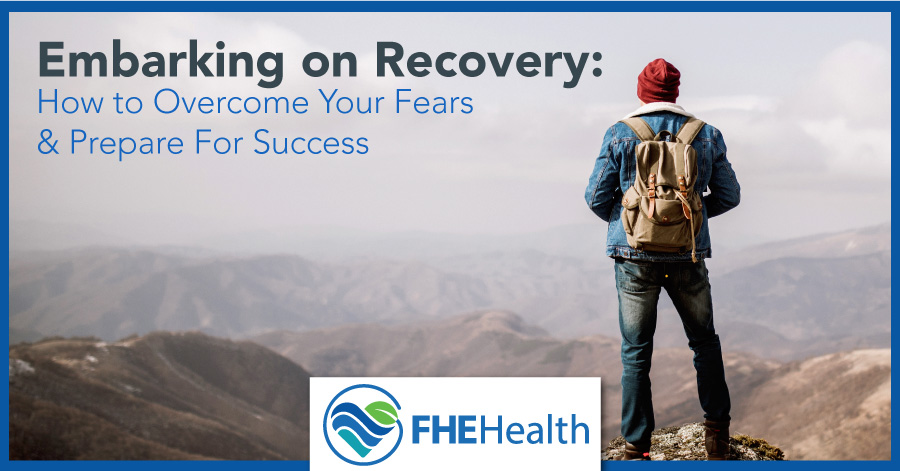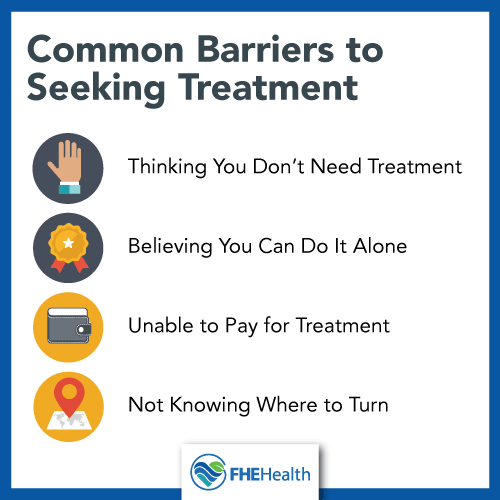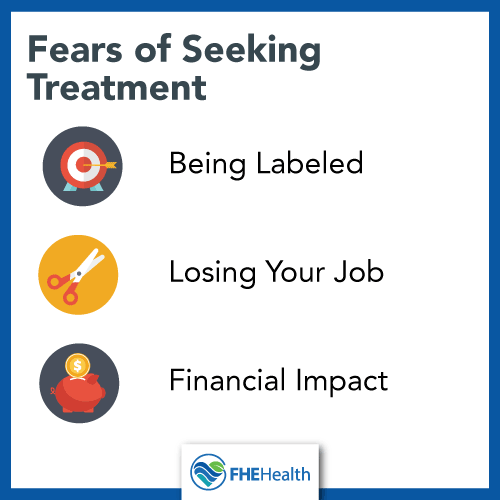
Prepare Yourself for Success
Addiction can be difficult to beat without the help of trained professionals, but those who suffer are often resistant to getting the assistance they need. Although admitting you have a problem that requires treatment can be hard, knowing what you’re up against helps you develop the right mindset for success.
Common Barriers To Admitting You Have A Problem
 Thinking you don’t need treatment: One of the most common issues faced by those suffering from addiction is the belief that it isn’t a problem. This idea can be particularly damaging, as shown by the 2014 National Survey on Drug Use and Health conducted by the Substance Abuse and Mental Health Administration. The results of the survey show that 90 percent of people with addiction issues choose not to take the first step to recovery, resulting in a much slower decline in overall substance abuse.
Thinking you don’t need treatment: One of the most common issues faced by those suffering from addiction is the belief that it isn’t a problem. This idea can be particularly damaging, as shown by the 2014 National Survey on Drug Use and Health conducted by the Substance Abuse and Mental Health Administration. The results of the survey show that 90 percent of people with addiction issues choose not to take the first step to recovery, resulting in a much slower decline in overall substance abuse.- Believing you can beat it alone: It’s a common belief that addiction can be overcome without treatment, but this often puts people at higher risk for relapse, indicating they need professional help. Once you’re ready to take that first step, addiction treatment that includes behavioral therapy and medical treatments greatly increase your chances of a full recovery.
- Inability to pay for treatment: For many people, the cost for addiction treatment can seem out of reach, which prevents them from taking their first step to recovery. While treatments for addiction and mental health challenges are not given the attention they deserve by private insurance companies, alternative options are available to get the help you need. Admission counselors at FHE are prepared to help you navigate the insurance process or assist you with self-payment options that fit your needs.
- Not knowing where to turn: Maybe you’re unsure of what action you need to take, and it feels easier to attempt recovery alone. This can be common in those who have already lost the support of loved ones and any resources they had to addiction. It’s important to remember that addiction causes changes in the brain that make it harder to take the first step to recovery and seek the help you need.
Consequences of Avoiding Treatment
Professional treatment centers, like FHE, offer a variety of proven tools and methods to help you overcome addiction. Without access to these techniques and treatments, recovery can be much more difficult and lead to a lower rehab success rate. If you choose to tackle your addiction alone, possible consequences include:
- Relapse: The probability of relapsing increases significantly, putting you at risk for overdose or criminal prosecution in the future.
- Psychological challenges: Fighting addiction is mentally challenging, and withdrawal can have serious psychological effects that are difficult to navigate without therapy. There’s also a chance that underlying mental disorders that contribute to your addiction continue to go undiagnosed and untreated.
- Physical challenges: Drugs and alcohol are hard on the body, so abuse can lead to medical complications that need monitoring and treatment. For some substances, withdrawal can be dangerous and should be monitored by a medical professional.
- Loss of support: Because relapse is so common, family and friends may be distrustful of your attempts to get over your addiction, leaving you to face it alone. By enrolling in a treatment program, you ensure someone is always there to advocate for your recovery.
Consequences of Seeking Treatment

- Being labeled: Professional treatment sends a message to your loved ones that you’re serious about getting your life back on track. Although some who didn’t know about your addiction may find out, this also allows those who care the opportunity to offer their support.
- Losing your job: If you’re working, some employers may be willing to hold your position to allow you the time you need to recover. For those who don’t have that option, remember that your professional opportunities will open up once you’re clean and sober, and a new job gives you the chance to make a fresh impression with your coworkers.
- The financial impact: Although treatment can sometimes be costly, so is an addiction. Wouldn’t you rather spend that money as an investment in your future than put it toward the substance that is trying to take your future away?
Admission Is the First Step to Recovery
If you find yourself frustrated by the hold addiction has on your life, remember that the first step to recovery is admitting to yourself that you need help. Although this can seem difficult, it really comes down to being open to accepting the help that’s available.
After this, working through the next steps to recovery will have a much greater impact, and you’ll be more receptive to the changes sobriety brings. This increases your chances of completing your treatment program successfully so you can get back to building a future without drugs or alcohol.
Take the First Step With FHE Today
FHE is here to help you take your life back by partnering with you to fight your addiction and giving you the tools you need for continued sobriety. Once you’re ready to accept the help we offer, contact us to speak with one of our caring admissions counselors to begin the process of developing a treatment plan tailored to your situation.
Our staff is available 24/7 to ensure you have someone to speak with at the moment you decide you’re ready to start your journey to recovery. They’ll help you navigate insurance and payment options, offer suggestions for protecting your employment opportunities and answer any questions you have about treatment.
Admission is the first step to recovery, so what are you waiting for? Every day you delay asking for the help you need is another day sacrificed to your addiction. Call FHE today to take back control and start your journey toward health and happiness.






